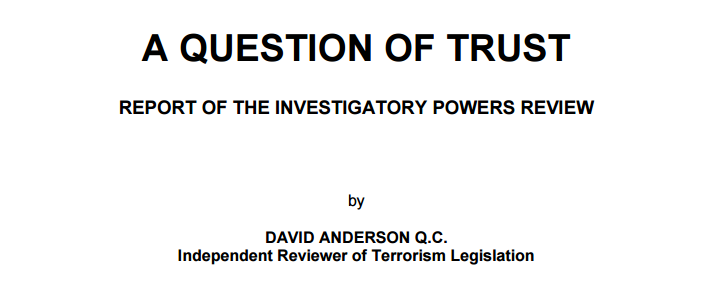Anderson Report on Terrorism Legislation
The Independent Reviewer of Terrorism Legislation, David Anderson QC, yesterday published his report into investigatory powers. The Anderson report on terrorism legislation is almost 400 pages long and includes 124 recommendations so you need some stamina to plough through it.
Following the report’s publication Home Secretary, Theresa May MP, gave a statement (watch it here) to the House of Commons. She set out a timetable and provided some general comments:
A draft bill (Snooper’s Charter revisited) will be published in the Autumn and subject to pre-legislative scrutiny by a Joint Committee. A Bill will then be published early in the New Year with a view to passing a final act before the DRIPA sunset clause come into effects at the end of 2016.
While generally accepting Anderson’s recommendations, May seemed to question the viability of his proposals to require judicial authorisations for warrants, highlighting the need for balancing the responsibilities of the Judiciary and Executive.
In addition to the draft bill, Government will look at a reform of the mutual legal assistance framework (in response to the Sheinwald Report which has not yet been published).
The Anderson Report
Overall approach by David Anderson is as follows:
‘A clear, coherent and accessible scheme, adapted to the world of internet-based communications and encryption, in which:
a. public authorities have limited powers, but are not shut out from places where they need access to keep the public safe;
b. procedures are streamlined, notably in relation to warrants and the authorisation of local authority requests for communications data;
c. safeguards are enhanced, notably by:
i. the authorisation of warrants by senior judges;
ii. additional protections relating to the collection and use of communications by the security and intelligence agencies in bulk;
iii. greater supervision of the collection of communications data, including judicial authorisation where privileged and confidential material is in issue or novel and contentious requests are made;
iv. improved supervision of the use of communications data, including in conjunction with other datasets and open-source intelligence; and
v. a new, powerful, visible and accountable intelligence and surveillance auditor and regulator.’
This forthcoming bill is going to require very careful scrutiny and it will be interesting to see how many of Anderson’s recommendations are implemented. Governments have a habit of listening to these things only when it suits them. Theresa May is already suggesting that she wants the power herself that Anderson is saying should be given to Judges. It’s exactly this situation that we want to avoid.
In principle I don’t think any sane person can object to a government wanting to make it easier for themselves to catch more crooks. However we don’t necessarily need to give them authority to monitor every one of us. Why can’t they stick to just monitoring suspected criminals?
Thanks to the ITSPA secretariat for some of the inputs to this post.
Other Snooper’s Charter posts (lots of them) here.

